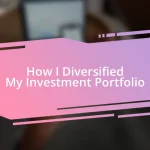Key takeaways:
- Effective financial management begins with understanding and aligning financial tools with personal goals and values.
- Utilizing budgeting and investment tools purposefully, while regularly reviewing and adjusting strategies, enhances financial growth and engagement.
- Being adaptable and seeking feedback from trusted sources can lead to improved financial strategies and opportunities for growth.
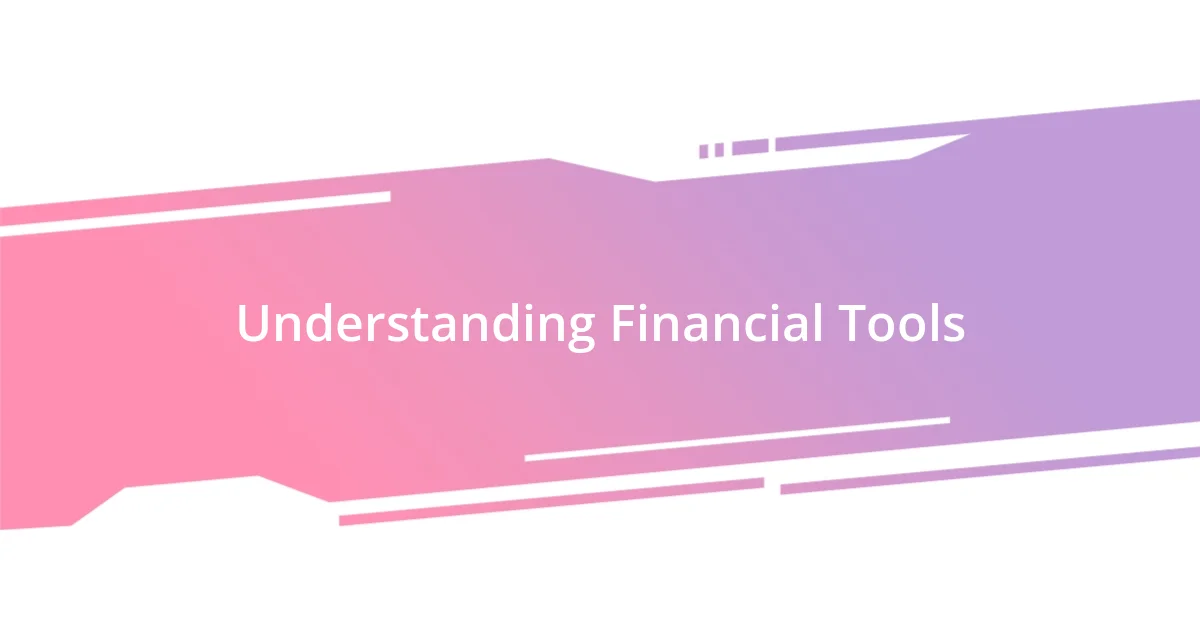
Understanding Financial Tools
Understanding financial tools is crucial for anyone looking to manage their finances effectively. When I first started my financial journey, I was overwhelmed by the sheer variety of tools available—everything from budgeting apps to investment platforms. I remember staring at my phone, wondering, “Where do I even begin?” It was through trial and error that I learned to assess which tools aligned with my goals and lifestyle.
One tool that really stood out for me was my budgeting app. Initially, I thought tracking my spending would be tedious, but I soon realized that seeing my expenses laid out helped me make informed decisions. Do you ever feel like your monthly expenses just slip through the cracks? I did, until I began categorizing my spending. This simple act not only kept my finances in check but also illuminated areas where I could save, allowing me to prioritize what truly mattered to me.
I also had a profound experience when I started using investment software. It was like opening a door to a new world where I could watch my money grow. Have you ever felt that thrilling rush when you make a smart investment? I remember when a stock I purchased not only rose in value but was also in line with my values, supporting renewable energy. That intersection of personal passion and financial growth was a revelation, highlighting how effective financial tools can transform our approach to wealth-building.

Identifying Your Financial Goals
Identifying your financial goals is like setting the compass for your financial journey. I recall the moment I sat down with a blank sheet of paper, trying to clarify what I truly wanted—saving for a down payment on a house or building an emergency fund. That exercise in introspection helped me recognize not just my financial aspirations but also my values. When you understand what’s important to you, it becomes clearer how to allocate your resources effectively.
To help you distill your thoughts, consider these guiding questions:
– What short-term goals do I have (e.g., vacations, new car)?
– What long-term dreams excite me (e.g., retirement, college funds)?
– How do I envision my financial future in the next 5, 10, or 20 years?
– What priorities must I address to feel secure and fulfilled?
– Are there any lifestyle changes I need to make to reach these goals?
Establishing these goals is vital, as the clearer they are, the easier it becomes to select the right financial tools to help you achieve them. Each insight steers you closer to your desired future.
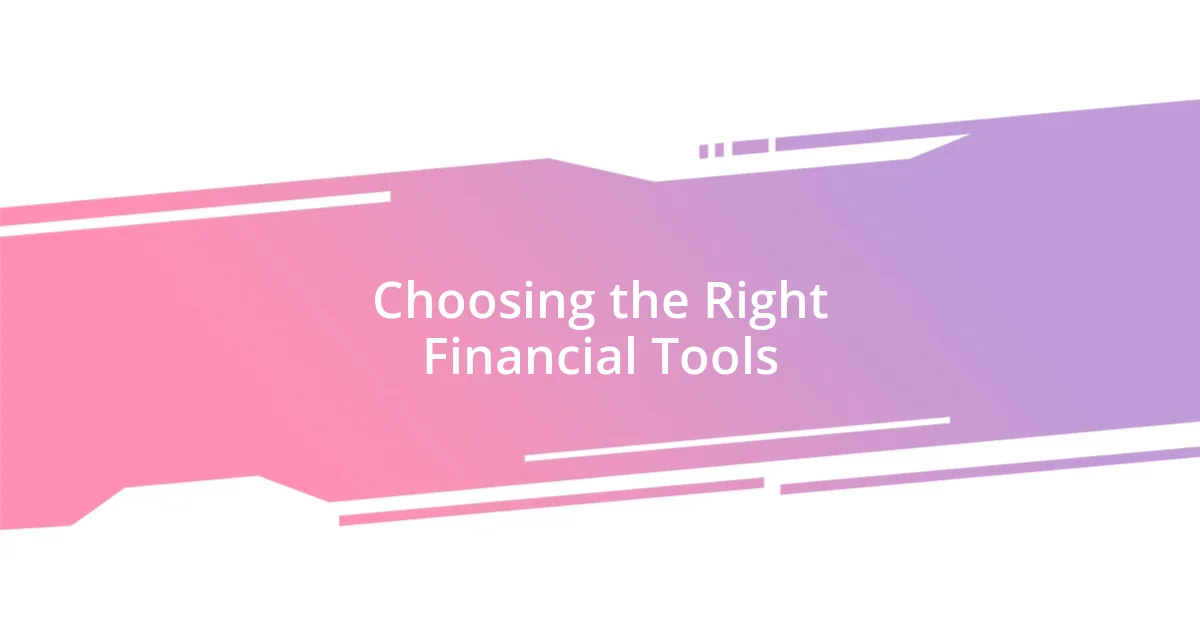
Choosing the Right Financial Tools
Choosing the right financial tools can sometimes feel like navigating a vast sea of options. I remember being excited yet frustrated as I explored online banking services, investment platforms, and budgeting software. Each had its allure, but what truly mattered was how well they fit my unique financial situation. Have you felt the impulse to try the latest app everyone raves about, only to realize it doesn’t resonate with your needs? It’s essential to remember that just because a tool works for others doesn’t guarantee it will work for you.
As I sifted through these options, I began to create a shortlist based on functionality and user experience. For instance, my initial enthusiasm for an investment app faded once I discovered that its interface felt clunky and overwhelming. It taught me a vital lesson: usability matters deeply. A financial tool that isn’t easy to navigate can quickly become a source of frustration rather than a helpful resource. I found myself gravitating towards platforms that offered intuitive designs and robust support, which ultimately enhanced my confidence and engagement with my financial journey.
Lastly, I can’t stress enough the importance of aligning any chosen tool with your financial goals. When I finally picked a budgeting app that not only tracked my spending but also set reminders for bill payments, it changed the game. It wasn’t just about managing my money; it was about taking new steps toward freedom and security. Choosing financial tools is more than just picking what’s trendy—it’s about making purposeful decisions that resonate with your values and aspirations.
| Criteria | Example Tools |
|---|---|
| Budgeting | Mint, YNAB |
| Investing | Robinhood, Acorns |
| Banking | Chime, Ally |
| Retirement | Betterment, Wealthfront |
| Expense Tracking | Personal Capital, Expensify |
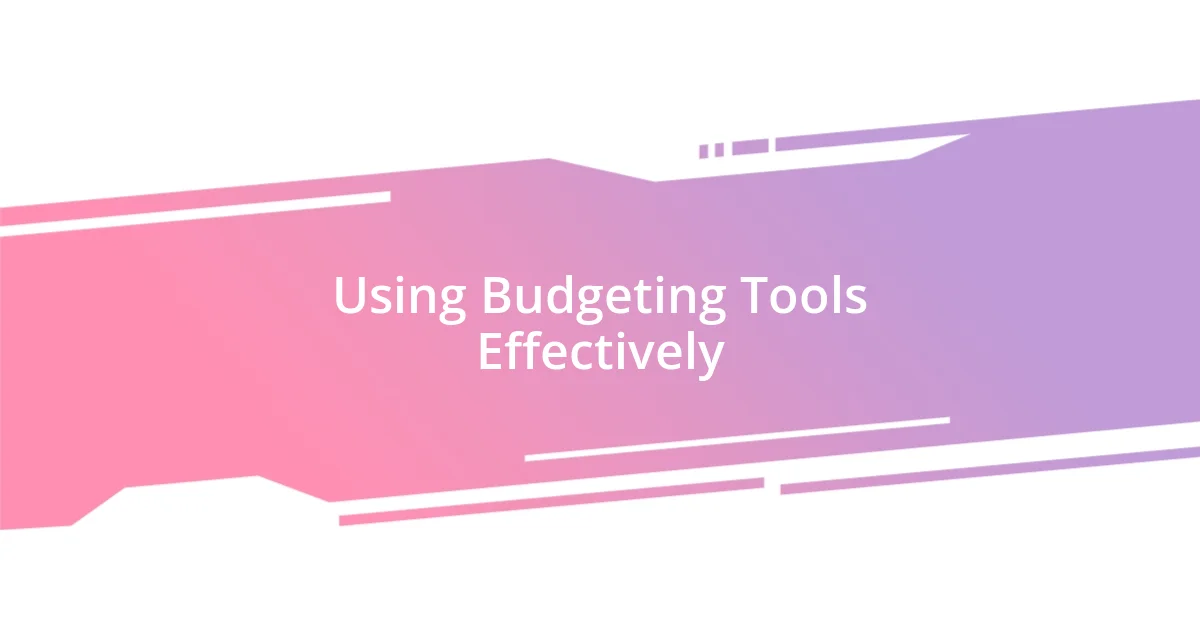
Using Budgeting Tools Effectively
Using budgeting tools effectively is all about making them work for you. I remember when I first started using a budgeting app; it felt overwhelming. I spent hours pouring over the features before realizing I only needed a couple of basic functions. Have you ever felt that way? Sometimes it’s easy to get lost in the bells and whistles instead of focusing on what will truly help you manage your finances better.
Once I dialed it down, I started categorizing my expenses. This simple act turned into a revelation. I was shocked to discover how much I was spending on dining out each month. The budget tool didn’t just show me numbers; it painted a picture of my habits. How can you expect to change your financial situation if you don’t understand where your money is going? For me, aligning my spending habits with my values became an empowering exercise.
Another key to using budgeting tools effectively is regularly reviewing and adjusting your budget. Initially, I set my budget and pretty much ignored it. It took a big pinch in my savings to realize that static budgets don’t work. Now, I treat my budget like a living document; I check in monthly and adjust it to reflect unexpected expenses or changes in my income. Have you considered how frequently you update your budget? This practice doesn’t just keep me on track; it also provides peace of mind, knowing that I’m actively engaging with my financial journey.
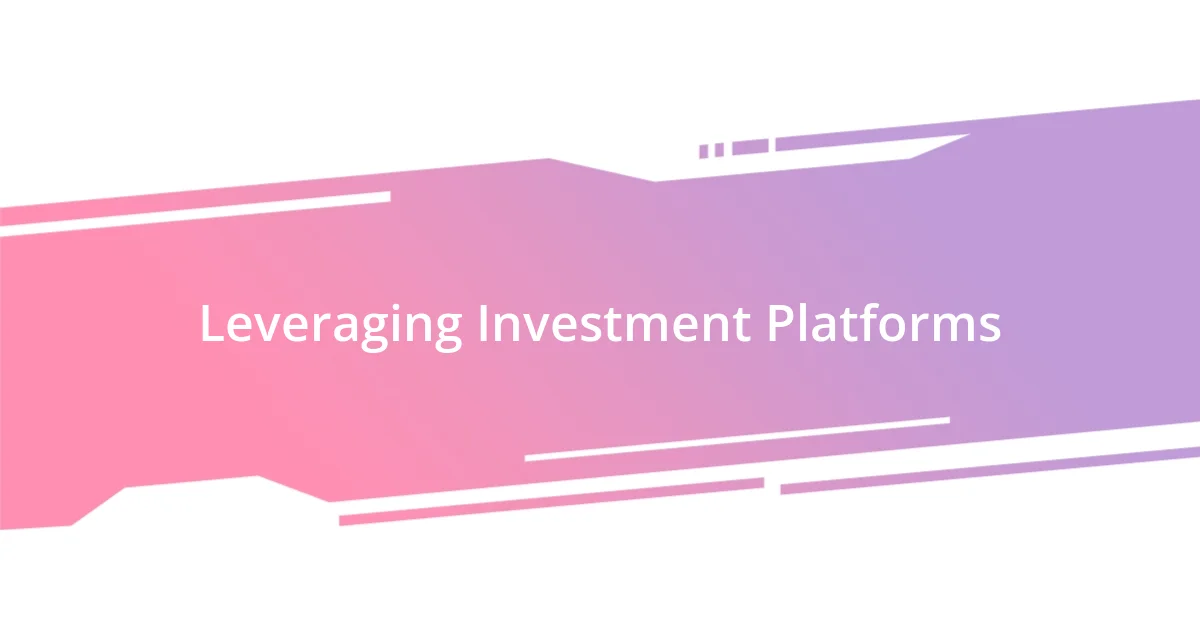
Leveraging Investment Platforms
When it comes to leveraging investment platforms, I’ve discovered that the best ones are not just about buying and selling stocks; they’re about building a community and gaining knowledge. I remember my initial experience with an online brokerage. It wasn’t just the user-friendly interface that caught my attention; it was the wealth of educational resources at my fingertips. Have you ever felt completely lost in the investing world? I certainly have. The right platform can bridge that gap, offering articles, webinars, and even forums where you can ask questions and learn from experienced investors.
Another vital aspect of investment platforms is their fee structure. When I first started investing, I was blissfully unaware of hidden fees eating into my returns. After realizing how expensive trading commissions could get, I switched to a platform that offered commission-free trades. This was a game changer for me. It allowed me to experiment with different investment strategies without fearing hefty costs. Have you checked the fees associated with your investment platform? It’s such an eye-opener to see how much more you can save and invest when the costs are minimized.
Moreover, I’ve found that the ability to automate investments can significantly enhance my financial journey. Setting up automatic contributions to my investment accounts removed the emotional barriers that often led to indecision. Initially, I hesitated, thinking I needed to time the market perfectly. But I soon realized that consistent investing, even in small amounts, compounded over time. It felt liberating to watch my portfolio grow steadily without constant oversight! Have you considered how automation could simplify your investing experience? Trust me, it can provide peace of mind and allow you to focus on the bigger picture.
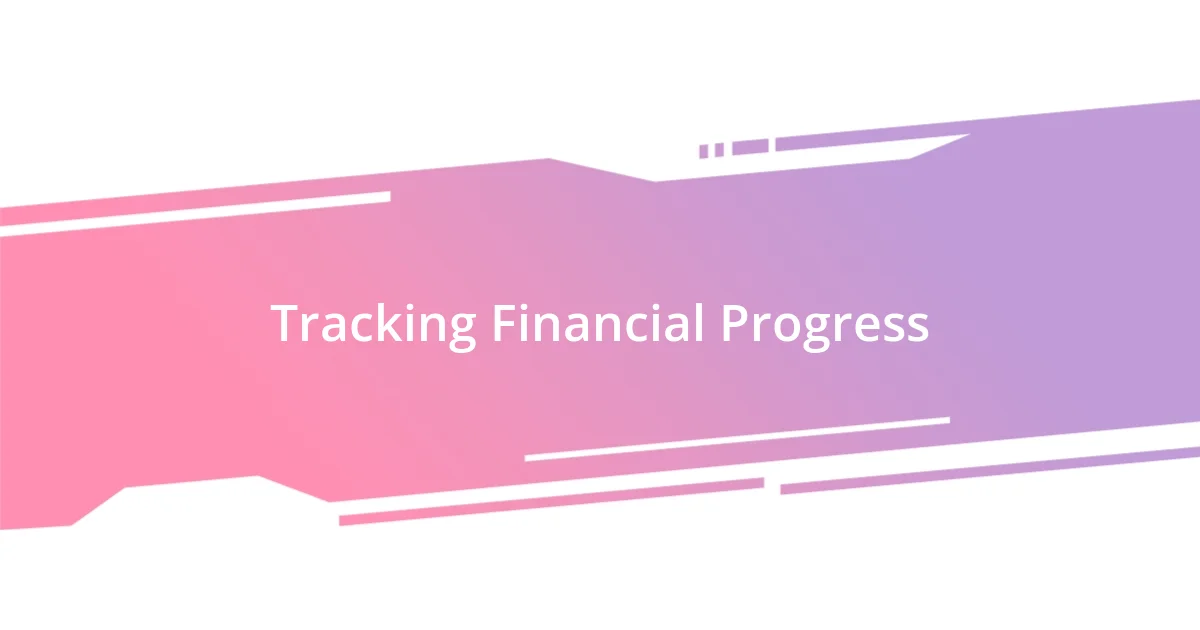
Tracking Financial Progress
Tracking my financial progress has been a transformative experience. I once kept everything in my head, thinking I could manage it all. But the moment I started using tracking apps, everything changed. I was astonished to see my financial habits laid out clearly right before my eyes. Have you ever felt that instant clarity when numbers start to tell a story? For me, it was like flipping on a light switch in a dark room.
One strategy that worked wonders for me was setting specific financial milestones. Initially, I aimed for broad objectives like “save more money,” which felt daunting. But when I broke it down into tangible goals—like saving $300 for a vacation or paying off a specific credit card—the process became less intimidating. Each time I achieved one of those milestones, I felt a rush of accomplishment. It’s a fascinating journey, isn’t it? Each small victory becomes a stepping stone that motivates you to keep moving forward.
In addition to setting milestones, I’ve also found that reviewing my progress regularly keeps me engaged. I started scheduling monthly check-ins, and that has become one of my favorite rituals. During these sessions, I not only celebrate my wins but also analyze any slips. The key here is not to dwell on the negatives but to learn from them. How did I overspend this month? What can I change next time? This process has made my financial journey feel more proactive, rather than reactive. Have you thought about incorporating regular reviews into your routine? Trust me, they can uncover trends you might not even realize are there.
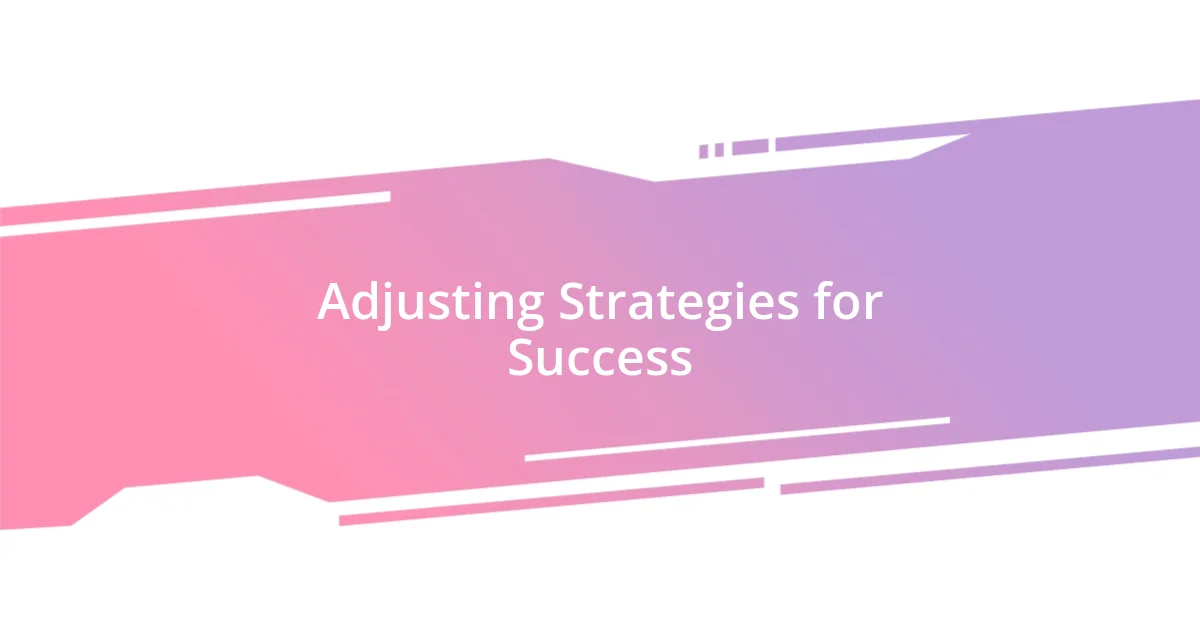
Adjusting Strategies for Success
Adjusting strategies for success in my financial journey has been an eye-opening experience. I vividly recall a time when I felt stuck, unsure of which direction to take. To get back on track, I embraced flexibility in my approach—testing various strategies and paying close attention to what truly resonated with my goals. Have you ever found yourself clinging to a strategy just because it’s familiar? Sometimes, letting go can lead to surprising new opportunities.
One significant shift for me was learning to pivot when unexpected market changes occurred. I remember a time when a sudden economic downturn rattled my carefully arranged plans. Rather than panic, I chose to reassess my portfolio and consider alternative investments. This adaptability not only cushioned my losses but also opened my eyes to the potential of diversifying into new asset classes. Has a market shift ever prompted you to reconsider your financial path? It’s in those moments of uncertainty that real growth can occur.
To solidify my success, I also started seeking feedback from trusted advisors and peers. Engaging in conversations about financial strategies has added a fresh perspective to my plans. I recall discussing my goals with a friend who shared insights that challenged my initial thinking. It prompted me to explore areas I hadn’t considered before. Have you tapped into the wisdom of your network? Surrounding yourself with knowledgeable individuals can be a game changer in refining your strategies and achieving your aspirations.













